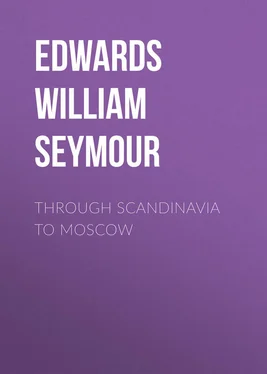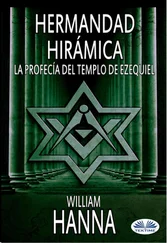William Edwards - Through Scandinavia to Moscow
Здесь есть возможность читать онлайн «William Edwards - Through Scandinavia to Moscow» — ознакомительный отрывок электронной книги совершенно бесплатно, а после прочтения отрывка купить полную версию. В некоторых случаях можно слушать аудио, скачать через торрент в формате fb2 и присутствует краткое содержание. Жанр: foreign_antique, foreign_prose, Путешествия и география, на английском языке. Описание произведения, (предисловие) а так же отзывы посетителей доступны на портале библиотеки ЛибКат.
- Название:Through Scandinavia to Moscow
- Автор:
- Жанр:
- Год:неизвестен
- ISBN:нет данных
- Рейтинг книги:4 / 5. Голосов: 1
-
Избранное:Добавить в избранное
- Отзывы:
-
Ваша оценка:
- 80
- 1
- 2
- 3
- 4
- 5
Through Scandinavia to Moscow: краткое содержание, описание и аннотация
Предлагаем к чтению аннотацию, описание, краткое содержание или предисловие (зависит от того, что написал сам автор книги «Through Scandinavia to Moscow»). Если вы не нашли необходимую информацию о книге — напишите в комментариях, мы постараемся отыскать её.
Through Scandinavia to Moscow — читать онлайн ознакомительный отрывок
Ниже представлен текст книги, разбитый по страницам. Система сохранения места последней прочитанной страницы, позволяет с удобством читать онлайн бесплатно книгу «Through Scandinavia to Moscow», без необходимости каждый раз заново искать на чём Вы остановились. Поставьте закладку, и сможете в любой момент перейти на страницу, на которой закончили чтение.
Интервал:
Закладка:
The cooking on this Danish boat has been good. We have keenly appreciated the improvement upon the diet of roast beef, boiled mutton, boiled ham, boiled potatoes, and boiled peas steeped in mint, which we have been compelled to exist upon during the past few weeks in Britain.
II
Esbjerg – Across Jutland, Funen and Zealand, the Little Belt and the Big Belt to Copenhagen – Friends Met along the Way
Here we are in “Kjoebenhavn,” which word you will find it quite impossible properly to pronounce, however strenuously your tongue may try.
My letter, beginning in Esbjerg, was broken short by the necessity of sleep. We wisely remained upon the ship and took full benefit of our comfortable berths. In the morning we were up betimes, obtained a cup of coffee and a roll, and then, sending our bags and baggage to the railway station, set out afoot.
The air was misty, full of a fine drizzling rain. It was regular Scotch and English weather, but the atmosphere was cooler and not so heavy as in Britain. The little stone-and-brick-built town is clean and neat, with its main street well asphalted. It lies on a gentle slope of hillside which lifts from the water. A giant lighthouse, rising from the highest point of land, is the first object to meet the view. Back of this, upon the level summit, lies the best of the town. The buildings are generally of one and two stories, with steep, gabled roofs.
H, in her Scottish “bonnet,” and I, in my raincoat, were quite impervious to wetness, and we spent the morning strolling here and there, stopping to see, among other things, the tubs and tanks of fish in the market square, where fishwives in big, white caps, stood quite heedless of the rain. The fish were almost wholly the famous roed spoette (red spots), one of the flounder family, much resembling the English sole.
Wanting cigars, I was tempted into a little shop, and found it kept by an intelligent young Dane, who instantly confessed to me, in good United States, that he had lived in America and there done well. In fact, it was plain to see that his heart still beat for the great Republic. His father had died and he had come back to Denmark to care for his old mother, and then, he had fallen in love with the blue-eyed daughter of a citizen of Esbjerg, an only child. So now, with several little Danes added to his charge, he was fixed fast in Esbjerg. But he was “always grieving for America,” he said. He delighted to see us, and sent for his young wife, who came smiling in to us with her baby in her arms. H says he told his wife in Danish, that we were Americans just like all others she would see, if she should ever reach New York! So I bought a box of cigars from him, instead of one or two, and found them good smoking and well worth the very moderate cost.
Crossing the market square to a long, low building, which somehow had about it that indefinable air suggestive of a breakfast comfortably cooked, we came to an inn, in the low-ceilinged dining room of which were little tables set about upon the sanded floor. Two or three men of the sea were smoking in one corner, a bar and a red-cheeked barmaid were in another, and two huge, yellow, Great-Dane dogs occupied most of the remaining space. We chose a table by the window and H ordered roed spoette , rolls and coffee. The fish was delicious, possessing a harder, sweeter flesh than the English sole; and rolls with salted butter rejoiced my palate, for I am dreadfully tired of English butter with no salt; and then we were given big brown pancakes with currant jelly, all we could eat. It was a breakfast fit for a Viking. The bill was only three kroner and twenty oere , which equals about eighty-six cents.
At the railway station, a mile from the docks, our tickets, bought in London, gave us the best on the train, better than similar carriages in England, for here they are bigger, with larger windows and the cars are set on trucks.
The journey to Copenhagen was over and through a sandy, flat and slightly rolling country, more carefully tilled and more generally cultivated than in England, with more grain, wheat and rye; with more vegetables, turnips, carrots, cabbage and potatoes. There were cattle, herds of large red cows, for Denmark is now the dairy of all Europe. But I saw no steers, nor beef cattle, fattening for the market, and but few sheep; nor any hogs running afield – the last are probably kept up. The houses are set singly upon the farms, are surrounded by outbuildings, and are usually of one story and often big and rambling with ells and gables, and generally have thatched roofs. The barns are big and substantial. More people are here upon the land than in England, and not living in clustered villages, as in France; the fields are divided usually by hedges. There are sluggish waterways and canals, and ponds where fish are bred and raised for market; and almost every hilltop is capped with a Dutch-looking windmill.
The train moved deliberately. It made from twenty to twenty-five miles an hour, stopping a long time at each station. We hadn’t gone far when a bald-pated, round-headed Herr climbed in and we speedily fell into talk with him. H speaks Danish enough to get on, and I use my pocket dictionary, and pick up what I can. His name was Hansen and he “owns” the “Hotel Kikkenborg,” at “Brammige,” wherever that may be. He told us of the country we were passing through and helped me on the Danish gutturals. You must gurgle the sounds down in your gullet as though you were quite filled with water, and the more profound the depth from which the sound comes forth, the more perfect the speech. We lost him at the first change of cars, when we boarded an immense ferryboat to cross the strait of water called the Little Belt, which separates the main land from the large island of Funen, but we found ourselves again in kindly company, this time, with a gray-bearded man and two ladies, his wife and daughter. He was “Inspector of Edifices” for the Government. They had been spending a few weeks on the island of Fanoe at Nordby, a fashionable seaside resort much patronized by the gentry of Copenhagen. He talked with me in fluent German, and the ladies conversed readily in French, while all spoke with H in Dansk and so we got on, fell fast friends and were introduced to a beau of the Froeken, a young “Doctor” who had “just taken his degree.” We sat together while crossing the island of Funen and on the ferryboat top all through the long sail across the Big Belt which divides Funen from the island of Zealand. Our friends here pointed out to us where it was that Charles X of Sweden, and his army of foot and horse and guns made their dare-devil passage on the ice that night in January, 1658, crossing the Little and Big Belts to Zealand and Copenhagen, forcing the beaten Danes by the Peace of Roskilde to cede the great Provinces of Skaania, Halland and Bleking, which made Sweden forever henceforth a formidable European state, – “God’s work,” the Swedes declared, for these salty waters were never before frozen solid enough to bear an army’s weight, – nor have they been since. We parted only at the journey’s end. Our friends were pleasant people of the aristocratic office-holding class, content to live simply on the modest stipend the Government may grant, who neither speak nor read English, and who listened to the tales of bigness in America with doubting wonder. “A building twenty stories high!” “Impossible!” “Eighty millions of people!” “Incredible!” “America already holds four hundred thousand Danes – one-fifth of the Danish race.” “Ja! Alas! That is too true!” “Our young men are never satisfied to come back to stay when once they have lived in America!” “Our young men don’t return, it’s hard upon our girls.”
Читать дальшеИнтервал:
Закладка:
Похожие книги на «Through Scandinavia to Moscow»
Представляем Вашему вниманию похожие книги на «Through Scandinavia to Moscow» списком для выбора. Мы отобрали схожую по названию и смыслу литературу в надежде предоставить читателям больше вариантов отыскать новые, интересные, ещё непрочитанные произведения.
Обсуждение, отзывы о книге «Through Scandinavia to Moscow» и просто собственные мнения читателей. Оставьте ваши комментарии, напишите, что Вы думаете о произведении, его смысле или главных героях. Укажите что конкретно понравилось, а что нет, и почему Вы так считаете.












